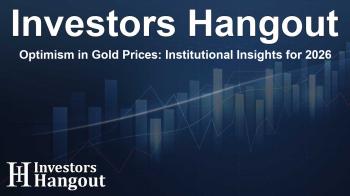Optimism in Gold Prices: Institutional Insights for 2026

Gold Market Insights Amidst Fluctuations
Recent drops in spot gold prices below $3,900 per ounce have raised questions about the future of the precious metal, yet many experts believe this is merely a temporary pullback rather than a major trend shift. The market dynamics influenced by a potential trade agreement have contributed to the current market scenario, but the underlying demand for gold remains unwavering.
The Role of China in Gold Demand
China is a significant factor driving the bullish trend in gold prices, fueled by central bank purchases, arbitrage trading, and a growing interest among Chinese households in owning gold as a safe haven. Noted chief economist Torsten Sløk from Apollo Global Management emphasizes that these factors collectively support a strong outlook for gold.
Macroeconomic Factors Supporting Gold Prices
The World Gold Council highlights the asset's resilience amidst ongoing economic uncertainties. Investors are currently faced with daunting growth and inflation challenges, creating friction for federal policy objectives, as outlined by asset allocation strategist Jeremy De Pessemier.
Investor Sentiments on Economic Conditions
With investor confidence wavering due to equities' extraordinary gains, concerns over potential valuation excess become prevalent. De Pessemier suggests that if economic pressures rise significantly, many investors may seek the safety of gold, which has historically proven to be a robust hedge against uncertainties.
Bond Market Insights
In addition to equities, the bond market is currently less reassuring, with long-term yields experiencing instability despite recent Federal Reserve initiatives to stimulate growth through rate cuts. The intricate interplay of tariffs, significant government spending, and inflation concerns continues to influence the gold market.
Future Projections: JP Morgan's Stance
Despite the corrections seen in the market, analysts maintain a positive long-term perspective on gold. JP Morgan, for instance, forecasts that gold could average a staggering $5,055 per ounce by late 2026, attributing this prediction to sustained investor interest and continued central bank acquisitions.
The Optimism of JP Morgan
Natasha Kaneva, JP Morgan’s Head of Global Commodities Strategy, affirms gold's position as their highest conviction for the year, citing factors such as lower real yields and heightened inflation anxieties as pillars supporting gold's momentum in the upcoming years. This sentiment aligns with a growing narrative around the asset's defensive characteristics amid economic turbulence.
Market Outlook and Additional Insights
As the world navigates various economic challenges, including inflation and trade disparities, the landscape for gold investment appears promising. The critical components that uphold this asset class reflect widespread institutional confidence as well as persistent retail enthusiasm, promising pivotal developments in the long run.
Conclusion: The Allure of Gold
In conclusion, gold remains firmly entrenched in the market's psyche as a resilient asset that offers protection for investors. The combination of macroeconomic uncertainty and increasing global demand paints a favorable picture that could lead to substantial gains in the coming years.
Frequently Asked Questions
What are the main factors currently impacting gold prices?
Gold prices are influenced by macroeconomic uncertainties, investor sentiment regarding equities and bonds, and significant demand from countries like China, alongside institutional buying.
How has China's purchasing behavior affected the gold market?
China's central bank purchases and growing interest among its households in gold as a safe-haven asset have significantly bolstered the demand for gold, contributing to its bullish outlook.
What projections are analysts making for gold prices in the future?
Analysts, including those from JP Morgan, project that gold prices could reach an average of $5,055 per ounce by the end of 2026, driven by sustained investor interest and central bank purchasing strategies.
What concerns do investors currently have about equities?
Investors are increasingly concerned about potential valuation excesses in equities, prompting many to consider shifting investment strategies towards safe-haven assets like gold.
How do economic conditions affect the bond market?
The bond market faces challenges from volatility in long-term yields, and economic pressures may complicate the Federal Reserve's ability to meet inflation targets, adding further uncertainty to the investment landscape.
About The Author
Contact Dylan Bailey privately here. Or send an email with ATTN: Dylan Bailey as the subject to contact@investorshangout.com.
About Investors Hangout
Investors Hangout is a leading online stock forum for financial discussion and learning, offering a wide range of free tools and resources. It draws in traders of all levels, who exchange market knowledge, investigate trading tactics, and keep an eye on industry developments in real time. Featuring financial articles, stock message boards, quotes, charts, company profiles, and live news updates. Through cooperative learning and a wealth of informational resources, it helps users from novices creating their first portfolios to experts honing their techniques. Join Investors Hangout today: https://investorshangout.com/
The content of this article is based on factual, publicly available information and does not represent legal, financial, or investment advice. Investors Hangout does not offer financial advice, and the author is not a licensed financial advisor. Consult a qualified advisor before making any financial or investment decisions based on this article. This article should not be considered advice to purchase, sell, or hold any securities or other investments. If any of the material provided here is inaccurate, please contact us for corrections.

